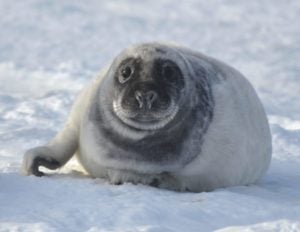
LONDON—Scotland has banned the shooting of seals by the fisheries industry in a move welcomed by Humane Society International/UK as critically important for seal welfare in British waters. Large numbers of seals are shot in Scotland every year in the name of protecting commercial fish farms and fisheries. HSI has long been highly critical of this cull on welfare grounds, highlighting the lack of independent oversight, potential under-reporting of numbers of seals killed, the killing of pregnant females and mothers who may have dependent pups, and evidence that shooting does not always lead to instantaneous death.
The Scottish Parliament has approved the Animals and Wildlife (Penalties, Protections and Powers) (Scotland) Bill which amends the Marine Scotland Act (2010), repealing the provision to grant licences for the shooting of seals on the grounds of protecting fisheries and fish farms. The penalty for illegal seal shooting has also been increased to 12 months’ imprisonment/£40,000 fine or, on indictment, unlimited fine/5 years’ imprisonment.
Since the licensing requirement for seal shooting took effect in 2011, Scottish government figures suggest that 1,917 seals have been shot in pursuit of fisheries protection, although HSI says the true death toll is likely to be higher because of potential underreporting and a lack of independent verification of kills.
The timing of this ban is linked to regulatory requirements under the US Marine Mammal Protection Act (MMPA) that come into effect in January 2022, meaning that Scotland would not be permitted to continue its lucrative salmon exports to the US after 2022 if it continued to allow seal shooting. In recent years, the US has been one of the top export markets for Scottish salmon, with exports worth £179m to the US reported in 2019. Whilst this is likely a significant driver in the development of the ban, HSI welcomes that officials from Marine Scotland told Members of the Scottish Parliament at a recent Committee hearing that the intention of the amendments is to enhance and improve the welfare of seals.
Humane Society International’s Senior Marine Scientist, Mark Simmonds OBE, says: “An alarming number of seals are shot and killed in Scottish waters, and there is evidence that some are likely to be injured and die a slow and painful death at sea and may not show up in the official statistics. It’s a huge concern and so a ban on seal shooting in Scotland is critically important for seal welfare in British waters. HSI has worked for many years to provide the solid scientific evidence needed to demonstrate the welfare impact on seals, so it is really excellent news that Scottish lawmakers have listened and put an end to the licensed seal cull in order to protect them from this cruelty.
“We share our seas with these charismatic marine mammals, and it is simply unacceptable to kill them for eating the fish in their ocean home. It is important that this ban comes swiftly into force and that the situation is carefully and independently monitored to ensure there is not a spike in seal killing in the run-up to its implementation, or indeed illegal killing afterwards. Benign methods to keep seals away from fish farms will need to be deployed and carefully observed to ensure that they are safe.”
Claire Bass, Executive Director of HSI/UK, said: “The majority of consumers are not happy for seals to be collateral damage in the price of salmon, and now US import requirements have introduced a strong economic incentive to call a halt to the cruel killing.”
The UK is home to two seal species, the grey seal and the harbour (or common) seal. Grey seals (Halichoerus grypus) are among the rarest seals in the world, and the UK population of some 124,000 grey seals represents approximately 40% of the world population, and 95% of the EU population. There are pup nurseries on many coasts between the Isles of Scilly in the south-west, clockwise to Donna Nook in Lincolnshire. The largest being in the Inner and Outer Hebrides, Orkney, Isle of May, Farne Islands and Donna Nook. Less than 15% of pups are born away from the above areas, but there is also an important breeding population on the west Wales coast.
The UK is also home to at least 33,400 harbour seals (Phoca vitulina) and whilst there has been a recovery, there is concern about declines in some populations. Only the eastern Atlantic subspecies P. vitulina vitulina occurs in Europe, where its range extends from Iceland and northern Norway southwards to northern France, including the Kattegat/Skagerrak and south-western Baltic. The UK population represents about 5% of the world population, approximately 50% of the EU population, and 45% of the European subspecies. The vast majority of common seal haul-outs are found on the coasts of Scotland.
Seals face a multitude of other threats in addition to shooting, including entanglement in fishing gear and marine litter, pollution and disturbance on their breeding and moulting grounds.
ENDS
Media contact: Wendy Higgins, HSI UK: whiggins@hsi.org
Notes:
In 2017 the US introduced regulations requiring ‘reliable information’ demonstrating that ‘exports of fish and fish products to the United States are not the product of an intentional killing or serious injury of a marine mammal’.
More information about the relevant welfare concerns can be found in these online papers which HSI has helped to produce: https://www.frontiersin.org/articles/10.3389/fmars.2016.00142/full and https://www.sciencedirect.com/science/article/pii/S0308597X17307303?via%3Dihub
